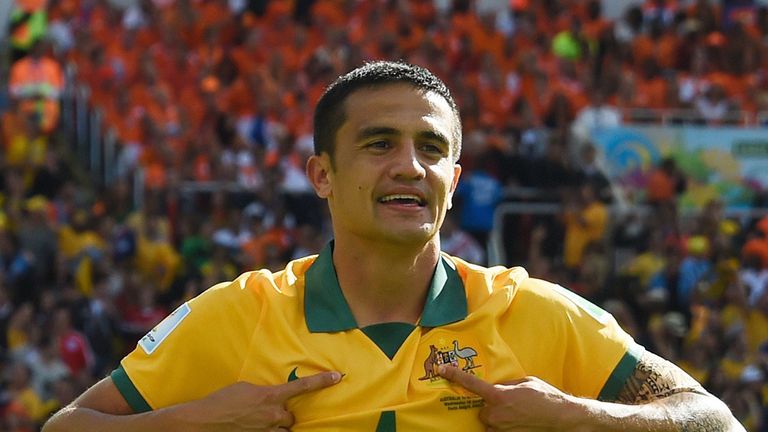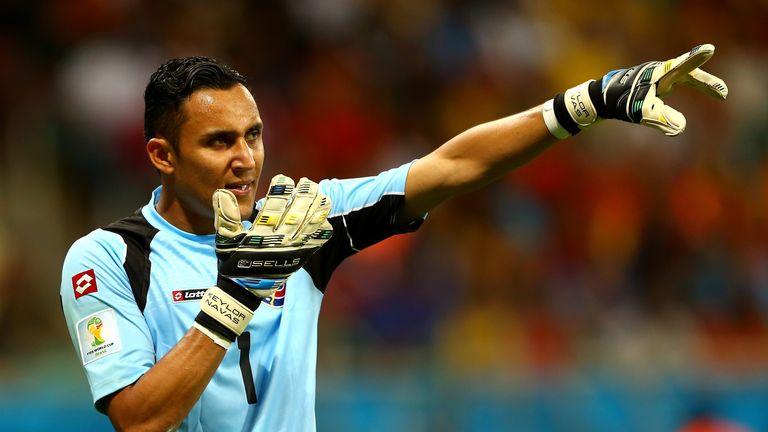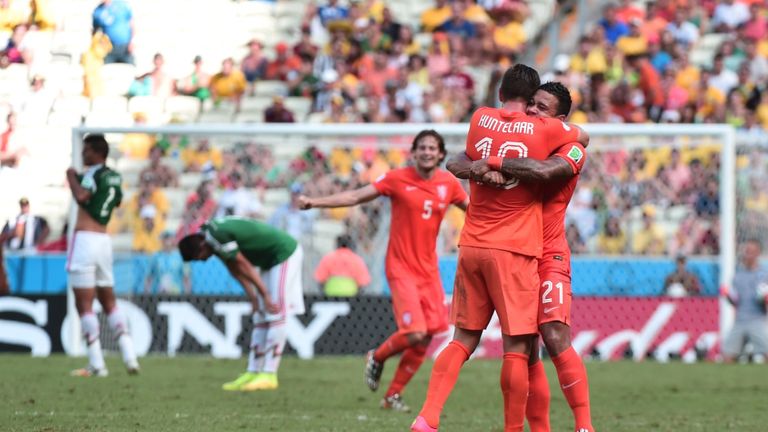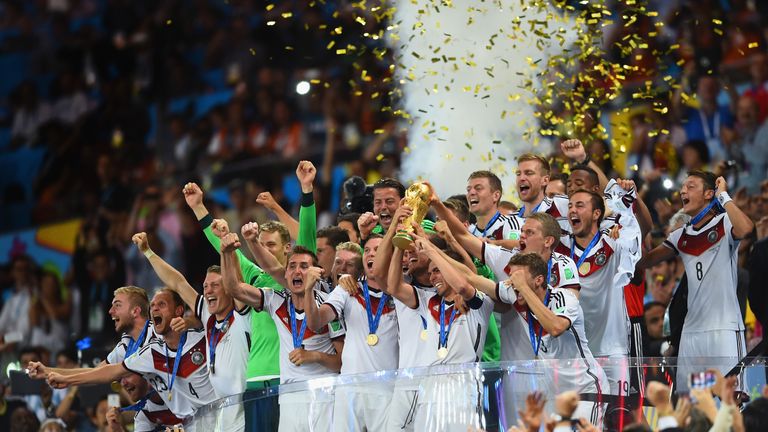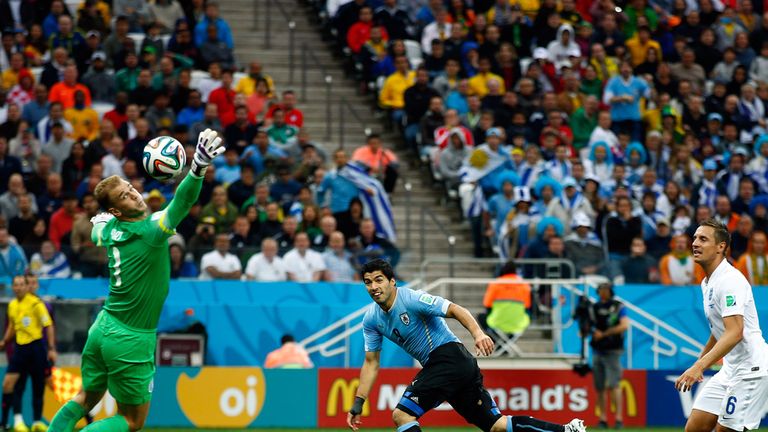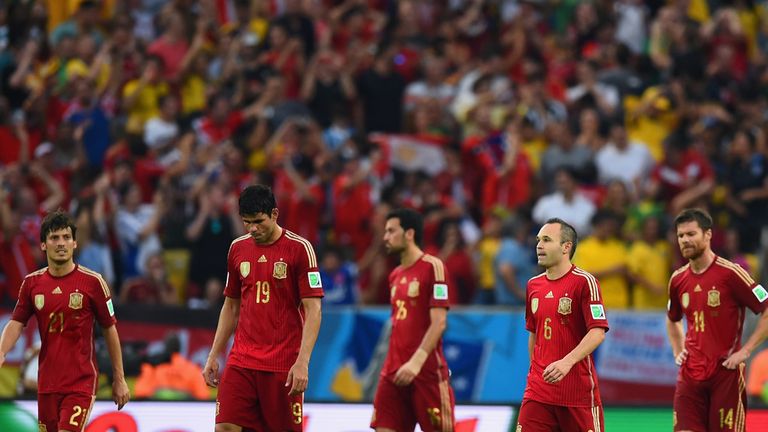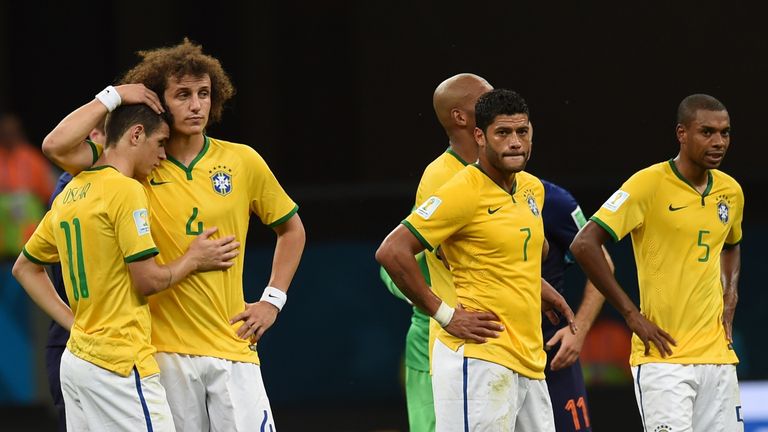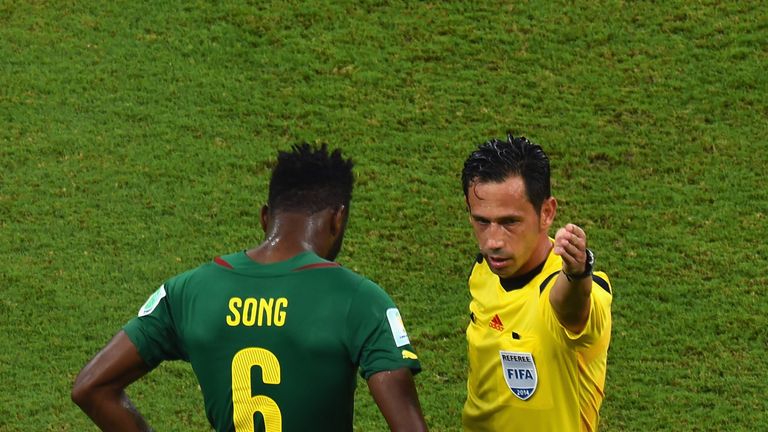World Cup: All the best facts & figures from Brazil 2014
It's certainly been a World Cup to remember. From drama and disappointment to goals and glory, Brazil 2014 will live long in the memory. With the help of our friends at Opta, here and just some of the facts and figures behind a very special World Cup...
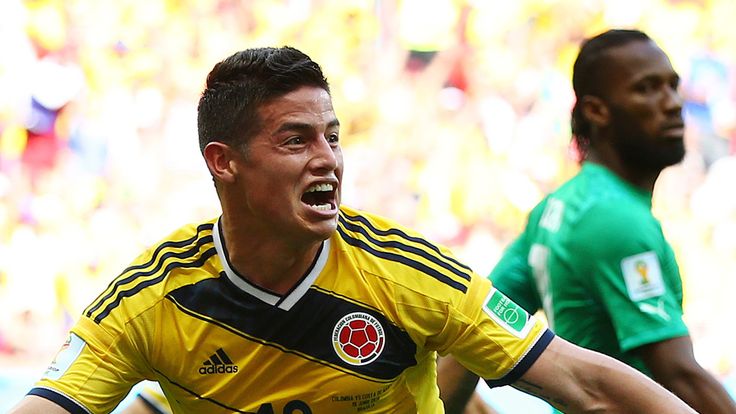
Wednesday 16 July 2014 13:36, UK
Who became the first player since the 1970s to score in his first five World Cup games? Who is now the oldest ever World Cup player? How many players have now won the European Cup and the World Cup in the same year? All that and lots more with Opta's World Cup facts...
GOALS
The 2014 World Cup saw a joint-high number of goals scored (171).
James Rodriguez became the first player to score in his first five career World Cup appearances since Peru’s Teofilo Cubillas (across the 1970 and 1978 tournaments).
There were more goals scored by substitutes in this World Cup than in any previous edition (32).
13.3% of shots have been scored at these finals; a higher proportion than in any other World Cup tournament since records began in 1966.
Trending
- 'Cultural overhaul needed' | Neville slams mediocre Man Utd
- Papers: Rashford loses Man Utd dressing room after public comments
- Impatient Ange vows to never change as Carra questions tactics again
- Liverpool latest: Wherever I end my career I am happy - Salah
- NFL Sunday recap: Dolphins beat 49ers to keep playoff hopes alive
- Transfer Centre LIVE! Could Maguire leave Man Utd for free next summer?
- Goals galore! Liverpool trump Spurs in NINE-goal bonanza
- Reaction as Christmas leaders Liverpool score SIX at Tottenham LIVE!
- Anderson stunned by De Graaf in shock Ally Pally exit
- Amorim: Anxiety around Old Trafford is affecting our mentality
There were only three direct free-kicks scored at these finals, the fewest since 1986 (3). In 2010 there were five scored, while in 2006 and 2002, nine were scored.
The only World Cup to see more own goals than this tournament (5) was the 1998 finals (6).
Tim Cahill has scored in three World Cups for Australia; no other Australian has done so in more than one tournament.
Ghana’s Asamoah Gyan (6) overtook Cameroon’s Roger Milla (5) as all-time top scoring African player at a World Cup.
Algeria became the first African team to score four goals in a World Cup game when they beat South Korea 4-2.
Keisuke Honda became the first Japanese player to score at two separate World Cups.
Switzerland’s Xherdan Shaqiri scored the first entirely left-footed hat-trick at a World Cup (1966-2014). His treble was also the 50th hat-trick in the history of the World Cup.
Clint Dempsey’s goal (29 seconds) vs Ghana for the USA was the fifth fastest in World Cup history.
GOALKEEPERS
Faryd Mondragón became the oldest player to ever make an appearance at a World Cup finals when he came on for Colombia v Japan (43y 3d).
Switzerland’s Diego Benaglio was the only goalkeeper to register a shot at the 2014 tournament, thanks to a late effort vs Argentina.
Algeria goalkeeper Rais M'Bolhi created two goalscoring chances for the Foxes; only three of his team-mates managed more in the tournament.
Costa Rica’s Keylor Navas saved 21 of the 23 shots on target that he faced at this World Cup (91%).
Tim Howard made 15 saves in the USA’s round of 16 defeat to Belgium – no goalkeeper has ever made as many saves in a single World Cup game (1966-2014).
PROGRESS
Three of the last four teams to win the World Cup have gone out in the following group stage (France 2002, Italy 2010, Spain 2014).
Italy have exited at the group stage in their last two World Cups. The last time they managed this was in the 1960s (1962 and 1966).
All eight group stage winners progressed to the quarter finals stage for the first time in World Cup history.
Honduras have now played nine games without a win at the World Cup (D3 L6). They have played more matches at the World Cup without winning than any other side (New Zealand, El Salvador and Bolivia – all six).
Ghana went out in the group stage for the first time ever (in their third World Cup). Now only three teams have never exited in a World Cup opening group stage: Germany, Netherlands and the Republic of Ireland.
Mexico have been knocked out of the World Cup finals at the second round stage in all six editions since 1994; no team has been knocked out at this stage as often as this.
Nigeria have lost all three of their World Cup second round ties (0-2 v France in 2014, 1-2 v Italy in 1994 and 1-4 v Denmark in 1998).
The Netherlands progressed to the semi-finals for the third time in their last four World Cups.
Argentina have progressed from all four of their World Cup semi-finals.
Costa Rica knocked out Italy, England, Greece and beat Uruguay, four sides placed in the top 12 positions of the FIFA Rankings (Uruguay – 7th, Italy – 9th, England – 10th, Greece – 12th).
REGIONS
UEFA have won the last three World Cups, the first time a single confederation has won three in a row.
Only six European nations made it to the last 16; a joint-World cup low since the Round of 16 was introduced in 1986.
This was the first time that three sides from the CONCACAF region made it out of the group stages and into the last 16 (since the format began in 1986).
GERMANY GLORY
Germany have reached the World Cup final for the 8th time; more often than any other side in the history of the competition.
Germany have scored 18 goals in these finals – the last team to score as many in a World Cup tournament was Brazil (also 18) in 2002.
Miroslav Klose became the top scoring player in World Cup history with his strike against Brazil in the semi-finals (16 goals).
Germany are the first European team to win the World Cup in the Americas.
Germany’s 7-1 win was the biggest margin of victory ever seen in a World Cup semi-final and they were the first team to score this many goals in the semi-finals.
Against Brazil in the semi-final, Germany were 5-0 up faster than any other team in World Cup history (29 minutes).
By losing 4-0 to Germany, Portugal conceded four goals in a World Cup for the first time in their history.
Thomas Muller has scored 10 goals and provided six assists in just 13 World Cup matches.
Mario Götze is the first substitute to score a winning goal in the World Cup final.
Mario Götze is the youngest scorer of a goal in a World Cup final since Wolfgang Weber in 1966 (22 years, 33 days).
Sami Khedira is the 10th player to win the European Cup/Champions League & World Cup in the same season.
With their destruction of Brazil, Germany became the top scoring nation in World Cup history (223), overtaking Brazil in the process. Germany ended the tournament with 224 goals, three ahead of Brazil.
ENGLAND AND ALL THAT
One point was England’s lowest-ever haul in a World Cup group stage.
In fact, this was the first time that England have been eliminated from a World Cup at the group stage since 1958.
Luke Shaw was the youngest player to play at this World Cup finals, when he played for England v Costa Rica (18y 348d).
England’s Wayne Rooney recorded his first World Cup assist in his teams opening game vs Italy and his first goal in their game vs Uruguay.
England goalkeeper Joe Hart made only one save in two World Cup games.
Germany scored two more goals vs Brazil than England have in their past two World Cup campaigns combined.
SORRY SPAIN
Spain conceded 5+ goals in an international (1-5 vs Netherlands) for the first time since losing 6-2 to Scotland in June 1963.
A four goal margin is the biggest losing margin by a defending champion at a World Cup.
In his 126 minutes of World Cup action, Diego Costa failed to muster a single shot on target (only five shots in total).
In winning Euro 2008, World Cup 2010 and Euro 2012, Spain conceded a total of six goals, one fewer than they did in their three matches at World Cup 2014.
BELEAGUERED BRAZIL
Nine of the 14 goals Brazil conceded in this World Cup came in the first 30 minutes of their games.
The 7-1 defeat to Germany equalled Brazil’s all-time biggest margin of defeat (lost 6-0 to Uruguay in 1920).
Brazil conceded 10 goals from 14 shots on target conceded in the semi-final and third place playoff game combined.
Neymar scored the 100th goal of the 2014 World Cup in Brazil’s 100th game in World Cup finals history.
Brazil’s 7-1 defeat to Germany was the biggest losing margin by a host nation at a World Cup.
Brazil committed 31 fouls in their quarter final win over Colombia; the most fouls that they had made in a single World Cup game since records began in 1966.
Brazil have topped every group they’ve played in at a World Cup from 1982 onwards.
AND FINALLY…
There were fewer red cards at the 2014 World Cup (10) than any other edition since 1986 (8).
But Alex Song picked up Cameroon’s eighth red card in their World Cup history. His relative Rigobert Song is one of only two players (along with Zinedine Zidane) to be sent off twice at World Cups, meaning the Song family is responsible for three of Cameroon’s eight reds.
